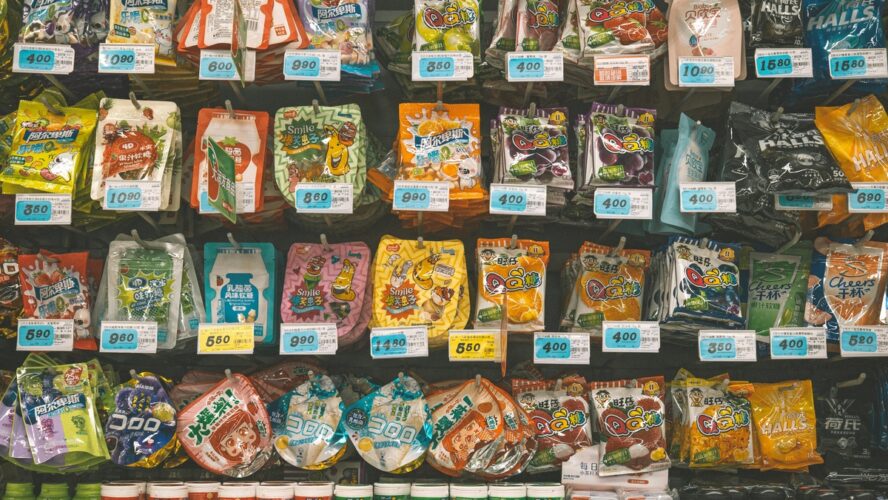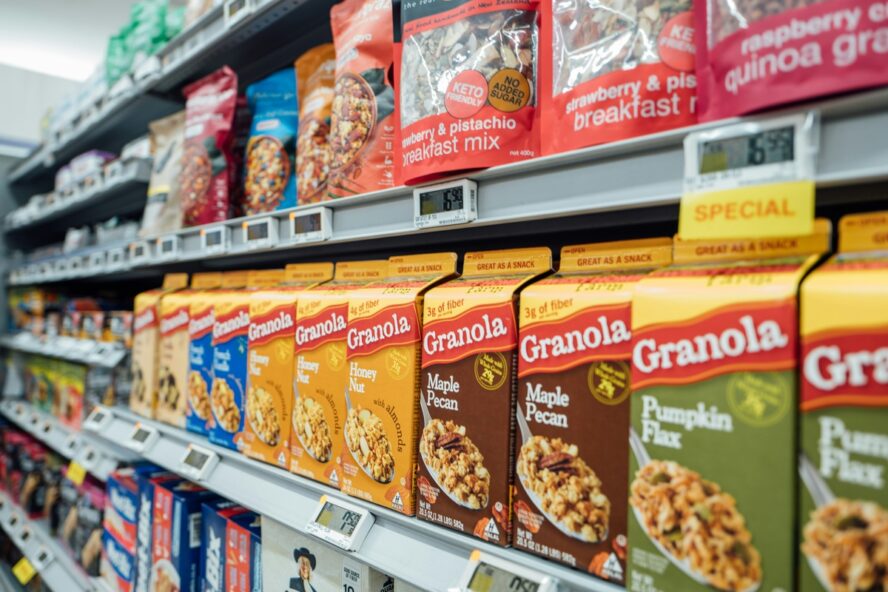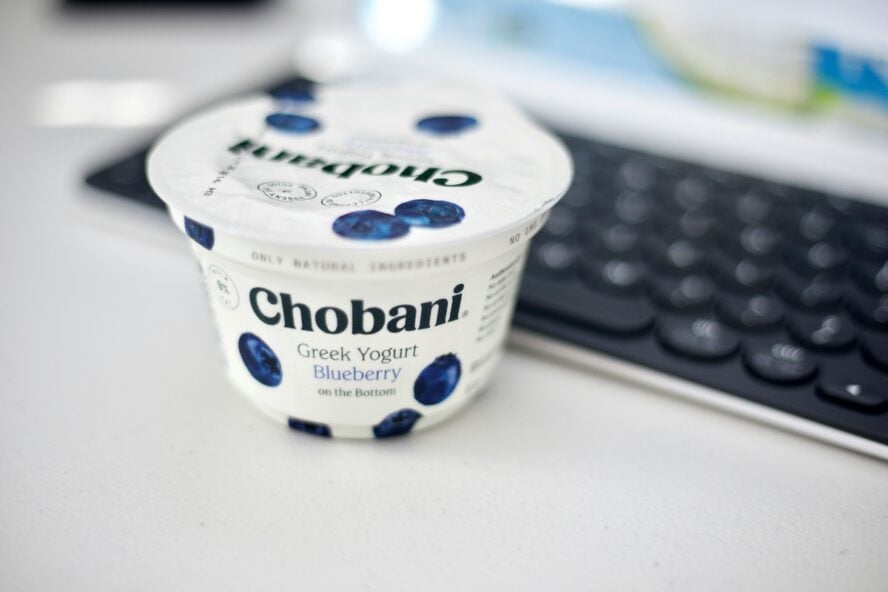
Ultra-processed foods have been linked to all sorts of negative health effects, including but not limited to an increased risk of cardiovascular disease1, diabetes, and even cancer2. To add to the list, a groundbreaking new study published in August in Nature Medicine has just identified a direct link to obesity3, confirming pre-existing evidence that avoiding ultra-processed foods may contribute to weight loss4.
What Are Ultra-Processed Foods?
As their name suggests, ultra-processed foods (UPFs) are defined as foods that contain artificial colors, preservatives, and additives like sugar, salt, and fat. Unlike plain old “processed foods” like canned fish, fruits in syrup, and freshly made breads, UPFs have more than two or three ingredients and typically contain additives that have been extracted from foods, like isolated starches, sugars, and hydrogenated fats.
Perhaps even worse than the studies about the negative health effects of UPFs are the numbers around how prevalent these foods are in the average person’s diet. New data released in early August from the Centers for Disease Control shows that more than half of the daily calories consumed by Americans come from ultra-processed foods5.
The Negative Effects of Ultra-Processed Foods
The negative health effects linked to these foods can come from their richness in chemicals and preservatives, explains Dr. Serena Goldstein, ND, who notes that these additives in foods can disrupt hormones, sleep, and the ability of the liver and kidneys to detox. “Weight gain is […] linked to poor sleep, hormone imbalance, increased risk of heart disease, and even just overall discomfort,” she says, “as these issues don’t necessarily happen by themselves.”
Ultra-processed foods often hold a low nutritional value, lacking many essential nutrients, and can be high in added sugars, saturated or trans fats, and sodium.
Lena Bakovic, MS, RDN, CNSC at Vnutrition
Ultra-processed foods can also negatively affect gut health, she says, and seeing as our gut microbiome is “a known player in weight gain,” these new findings are perhaps no surprise.
For Lena Bakovic, MS, RDN, CNSC at Vnutrition specialized in gut health, weight management, and disordered eating, the dangers of UPFs aren’t just linked to additives; they’re also particularly poor in the nutrients we need.
“Ultra-processed foods often hold a low nutritional value, lacking many essential nutrients, and can be high in added sugars, saturated or trans fats, and sodium,” she says. “Regular and/or excessive intake of calorically dense, processed, and low nutritive value foods can not only contribute to weight gain but also increase inflammation in our bodies and the increase our risk for chronic diseases such as cardiovascular disease, Type 2 diabetes, and cancer.”
Don’t Be Fooled by UPFs Pretending to Be Healthy

In what is perhaps a surprising and frustrating irony for those attempting to make healthy choices, Bakovic expands, many ultra-processed foods masquerade as health foods. Examples of ultra-processed foods aren’t just beef jerky and Doritos — even foods that seem innocuous can have negative health effects.
“Breakfast cereals are a big one and are often promoted as being nutritious,” she says, “but many contain high amounts of added sugars, even if they are labeled as being ‘whole-grain.’”
Fruit-flavored snacks and beverages are also on the list of worst offenders. They often have labels suggesting they’re made from real fruit, but include artificial fruit flavors, sweeteners, and colors instead. Similarly, protein and energy bars are frequently advertised as ‘healthy’ or ‘high-protein,’ but some are packed with added sugars, unhealthy fats, and artificial ingredients.
A Tie Between UPFs and Obesity
The link between UPFs and obesity isn’t a new discovery. A research review published in July in Nature Reviews Endocrinology summarized the current literature, which researchers wrote “strongly supports and corroborates” the idea that a diet high in ultra-processed foods promotes overeating and increases the risk of obesity6. But this new study is the first to show causality between reducing consumption of UPFs and weight loss.
“Most studies linking ultra-processed foods and health changes are cross-sectional, meaning they look at data from a population (such as nutrient and calorie intake from food logs) at a specific point in time,” explains Rachel Gargano, MS, RD, CSSD, CBS, Chief Registered Dietitian at Live it Up. “These studies are also observational, meaning the researchers do not intervene in the population’s behaviors. Because of this, these types of studies aren’t good for figuring out cause-and-effect relationships (causality), and can really only pinpoint associations.”
The First Study to Show Causality
This new study’s controlled nature was able to conclusively prove that consuming fewer ultra-processed food directly contributes to weight loss. Participants followed two different diets, one made up of minimally-processed whole foods like pasta, chicken, fruits, and vegetables, and the other of ultra-processed foods like frozen meals, protein bars, and shakes. Participants following the minimally-processed diet lost twice as much weight.
The 55 study participants were mainly women, all of whom were overweight or obese before the study and who got an average of about two-thirds of their calories from UPFs before the study. One group of participants followed the minimally-processed diet for two months, returned to their normal diets for one month, and then followed the ultra-processed diet for two months. The other group followed the diets in the opposite order. No matter which diet they were following, they could eat whatever quantity of food they liked.
The results were undeniable. While most participants lost weight on both diets, on average, they lost about four pounds on the minimally-processed diet and two pounds on the ultra-processed diet.
Even High-Quality UPFs are Problematic

One major takeaway from this study was around the quality of the UPFs. Both diets met U.K. nutrition guidelines, including recommended amounts of nutrients, fiber, and produce. Plus, the UPFs chosen for the processed food diet were marketed as healthier options, like whole grain breakfast cereals and flavored yogurt. This shows that even “better-for-you” UPFs can be a detriment to weight control.
This isn’t surprising to experts, who cite several reasons why even seemingly healthy ultra-processed foods can contribute to weight gain. “UPFs are energy dense, meaning they pack more calories per gram than most minimally processed foods,” explains Gargano. “Since our stomach knows volume, not calories, we have to eat a certain amount to feel satisfied. So to feel ‘full,’ you have to eat a lot of UPFs — which means more calories in general.”
She gives the example of broccoli versus cheddar fish crackers. “Let’s say that we are full after eating 3 cups of food,” she says. “That means we’re the same ‘fullness’ whether we eat 3 cups of cheddar fish crackers or 3 cups of broccoli. But 3 cups of cooked broccoli is about 150 calories while 3 cups of cheddar fish crackers is about 900 calories. Broccoli is nutrient-dense, not calorie-dense; packed with fiber, water, and micronutrients. You fill up on its volume without overdoing it with calories.”
Bakovic agrees. “The nutrient distribution (or lack thereof) in these foods can make it relatively easy for some individuals to consume them without experiencing a feeling of fullness. In other words, they are kind of a source of relatively empty calories.”
UPFs and Overeating

Another reason why it’s easy to overeat ultra-processed foods is quite simply because they’re designed for it. “They are precisely engineered to taste good and developed to make it easier for us to overeat them,” explains Gargano7. “The additives present in ultra-processed foods can create a very palatable taste profile,” Bakovic adds, “which can influence overeating.”
Indeed, the participants reported feeling like they had better control of food cravings on the minimally-processed diet, something that surprised lead author Dr. Samuel Dicken, a research fellow at University College London. “When people lose weight,” he told the New York Times, “they tend to want to eat more.”8 Better control of cravings could lead to sustained weight loss over time.
Try Sticking to an 80/20 Diet
So given this new study, what’s the best way to proceed? It doesn’t need to be all or nothing. For the healthiest diet, focus on whole foods whenever possible — but leave yourself a little room for mindful indulgence. If it helps you to aim for a target or have a bit of structure, try applying the 80/20 rule. Make it a goal to stick to a whole, unprocessed foods diet 80% of the time, and then allow yourself to enjoy not-so-healthy treats for the other 20%.
“Ultra-processed foods can certainly be delicious and cutting them out completely may not be an option for everyone,” says Gargano. “Rather than stressing about every little detail, the most important thing we can do is try to keep UPFs to less than 20% of what we eat in a day. This way we are filling our bodies with the macro- and micro-nutrients we need for our health, but we are also taking the opportunity to enjoy life and enjoy eating by keeping a small amount in our diet. Balance is the ultimate goal.”
Sources:
- https://www.sciencedirect.com/science/article/pii/S2161831323013820
- https://pubmed.ncbi.nlm.nih.gov/37087831/
- https://www.nature.com/articles/s41591-025-03842-0
- https://www.nature.com/articles/s41574-025-01143-7
- https://www.cdc.gov/nchs/products/databriefs/db536.htm
- https://www.nature.com/articles/s41574-025-01143-7
- https://www.cell.com/cell-metabolism/fulltext/S1550-4131(19)30248-7
- https://www.nytimes.com/2025/08/04/well/eat/avoiding-ultraprocessed-foods-might-double-weight-loss.html

